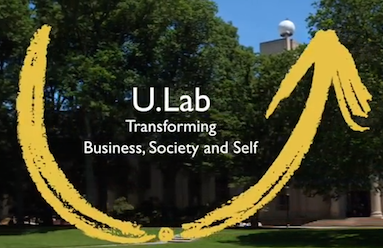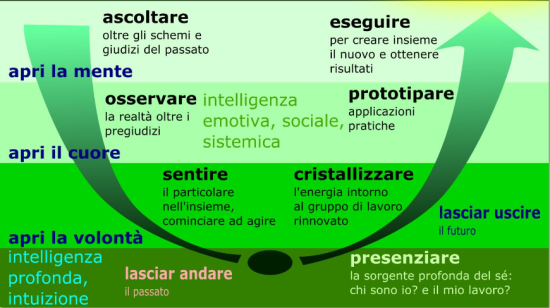Susan E. George*
the U.lab path
“Why do almost all of us wake up in the morning individually unhappy with the way things are going, and collectively incapable of changing the course of History?“
That’s the question Otto Scharmer and the team at the Presencing Institute at MIT in Cambridge MA have been asking themselves, and the tens of thousands of people enrolled in their free MOOC (massive open online course: massive, open, virtual course), U.lab: Transforming Business, Society and Self [1], to seek answers.
Run by edx, this is a course on how to transform the way we do business, build a more just and environmentally sensitive society, and encourage individuals to access their highest potential, and it begins with images of the beauty and vulnerability of the earth sent by astronauts on the Apollo missions.
These images are used to help participants change their perspective. In fact, the authors of the course want to encourage us to see our behavior from other points of view. They want to bend the beam of Galileo Galilei’s telescope back towards us so that we understand that we are part of a system and consequently the cause of certain problems, as well as possible solvers.

from ego-system to eco-system
To get to a positive change, we need to get out of an ego-system and into an eco-system using different ways of listening, perceiving and acting. The book underlying the course, written by Scharmer and Kaufer (2013) and translated by SOL Italy (Franco Angeli, 2015) is in fact titled “Leading from the Emerging Future: From Ego-System to Eco-System Economies” and illustrates the path from society 1.0. to society 4.0. (read next article)
The new ways of listening and acting are summarized in theory U below.
On the left side of the curve, during the first 2 weeks of the course, you learn to unload the old ways of listening and perceiving in order to get to the bottom of the U-curve in the third week where you have to stop to allow the old in order to leave space for the emerging new to enter. Armed with this new willingness it will be possible to climb the U curve, crystallizing new intentions and prototyping new actions within ecological communities in the last three weeks of the course.
It may sound utopian, but it is extremely effective, as is demonstrated by the growing number of hubs espousing this theory around the world.
[1] A new MOOC course on this topic will begin on October 22, 2021. It is already possible to register on http://bit.ly/1fAS1Wf
* Susan E. George “English, Celtic, Neapolitan. Rambler and thespian who has forgotten her past as a university professor. President of the degree course in Public, Social and Business Communication at the University of Pisa. Fascinated by the importance of dialogical modalities (which is also the subject of her research) in the creation of organizations that are willing to learn by learning“

